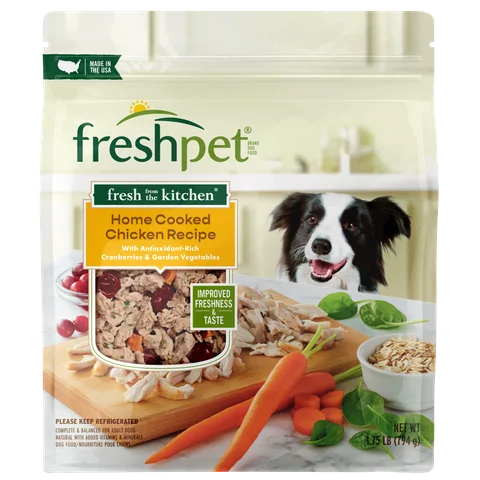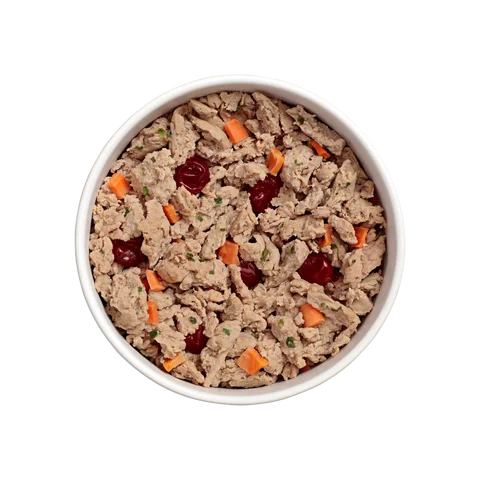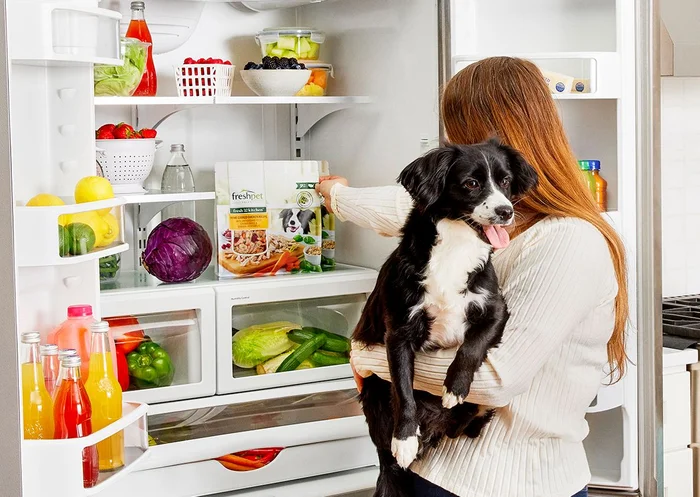


A Guide to Nourishing Your Canine Companion
written by Freshpet
Nutrition plays a crucial role in the overall health and well-being of our beloved canine companions. Just as we carefully consider our own diets, it's essential to pay close attention to what we feed our dogs to ensure they thrive and live their best lives. Let’s explore everything you need to know to provide your furry friend with nourishing meals tailored to their specific needs.
When it comes to storing dog food , investing in high-quality containers designed specifically for this purpose can make a significant difference in maintaining freshness and nutritional value. One example of a quality food container for pets is the Gamma2 Vittles Vault Airtight Pet Food Storage Container. This container features an airtight seal that locks in freshness and keeps pests out, ensuring that your pet's food stays fresh for longer. Its durable construction also helps protect the food from moisture and humidity, preventing it from becoming stale or moldy.
Another excellent option is the IRIS USA Airtight Pet Food Storage Container. This container is made of BPA-free plastic and features airtight seals and snap-lock latches to keep food secure and fresh. Its translucent design allows you to easily monitor the food level, so you know when it's time to replenish it. Additionally, it comes with wheels for easy mobility, making it convenient to move around, especially if you have multiple pets or need to store food in different locations.
These examples demonstrate the importance of selecting the right food container for your pet's needs. By choosing a container that provides airtight seals, protection from pests and moisture, and convenient features for easy access and mobility, you can ensure that your pet's food remains fresh and nutritious, promoting their overall health and well-being.
When it comes to the shelf life of healthy dog food, several factors come into play, influencing how long it remains fresh and safe for consumption. One significant factor is the quality of the ingredients used in the food. Higher-quality ingredients often have fewer preservatives and additives, which can affect the food’s longevity. Additionally, the formulation of the food, including its moisture content and fat levels, can impact its shelf life.
To determine if pet food has expired or gone bad, pet parents should be mindful of several indicators. One common sign is a change in the food's appearance, such as discoloration, mold growth, or an unusual odor. If the food looks or smells off, it's best to discard it to avoid potential health risks for your pet. Additionally, pay attention to the texture of the food—dry food that has become excessively dry or oily may indicate spoilage.
Another factor to consider is the expiration date or "best by" date printed on the packaging. While these dates can provide a general guideline for the food's freshness, they are not always accurate indicators of spoilage. It's essential to inspect the food visually and use your judgment to determine if it's still safe for your pet to consume.
Understanding the factors that influence the shelf life of pet food and knowing how to identify signs of spoilage are essential for ensuring your pet's safety and well-being. By storing pet food properly and regularly inspecting it for any changes in appearance, odor, or texture, you can help maintain its freshness and provide your furry friend with nutritious meals.
Different life stages require different nutritional needs for your pet. From essential nutrients for growth and development in puppies to maintaining optimal weight and energy levels in adult dogs, it's crucial to adjust your dog's diet accordingly.
· Puppy Nutrition: Puppies have specific dietary needs to support their rapid growth and development. Essential nutrients such as protein, fat, and calcium play a crucial role in bone and muscle development, organ function, and overall health. A well-balanced diet rich in these nutrients is essential for ensuring puppies reach their full potential and develop into healthy adult dogs.
· Adult Dog Nutrition: Adult dogs require a balanced diet to maintain optimal weight, energy levels, and overall health. A diet consisting of the right balance of protein, fats, carbohydrates, vitamins, and minerals helps adult dogs maintain muscle mass, support immune function, and sustain energy levels for daily activities. Proper nutrition is essential for preventing obesity, promoting longevity, and supporting overall well-being in adult dogs.
· Senior Dog Nutrition: As dogs age, their nutritional needs change, requiring adjustments to their diet to address aging-related health concerns. Specialized diets for senior dogs often focus on joint support, as many older dogs experience arthritis or joint pain. Reduced-calorie diets may also be necessary to prevent obesity and maintain a healthy weight in senior dogs who may be less active. Additionally, senior dog diets may include nutrients like omega-3 fatty acids and antioxidants to support cognitive function and immune health, promoting a higher quality of life in their golden years.
Different dog breeds have unique nutritional requirements. Small breed dogs have unique dietary needs that differ from larger breeds. Calorie density is a crucial consideration for small dogs because they have faster metabolisms and higher energy requirements relative to their body size.
Providing nutrient-dense food ensures they get the energy they need without overeating. Additionally, dental health is important for small breeds, as they are more prone to dental issues due to their smaller mouths and crowded teeth. Choosing smaller sized food, or dental-specific formulations can help support their dental hygiene. Lastly, small breed dogs may have faster metabolisms, so their diet should be balanced to support their unique metabolic needs, ensuring they receive adequate nutrition for their size and activity level.
Large breed dogs require special attention to their diet to support their growth, joint health, and overall well-being. Controlling growth is essential for large breed puppies to prevent developmental orthopedic diseases such as hip dysplasia and osteoarthritis. Feeding a diet formulated specifically for large breed puppies helps regulate their growth rate and promote proper skeletal development.
Joint health is another critical consideration for large breed dogs, as they are more prone to joint issues like hip dysplasia and arthritis. Providing food enriched with glucosamine, chondroitin, and omega-3 fatty acids supports joint health and mobility. Balanced nutrition is essential for large breed dogs to maintain a healthy weight and prevent obesity, which can exacerbate joint problems. Additionally, large breed dogs may benefit from diets with lower energy density to prevent excessive weight gain and reduce the risk of orthopedic issues. Understanding these breed-specific needs can help you select the right food for your dog.
Some dogs may have special health conditions that require dietary adjustments. Whether it's allergies, weight management issues, or digestive health concerns, there are specific diets and strategies that can help address these issues and improve your dog's overall health and well-being.
· Allergies and Food Sensitivities: Just like humans, pets can develop allergies and food sensitivities that can cause discomfort and health issues. Common allergens for pets include ingredients like beef, chicken, dairy, wheat, and soy. Identifying these allergens is crucial for managing your pet's diet effectively. Veterinarians may recommend hypoallergenic diets, which are formulated to exclude common allergens while providing essential nutrients. These diets typically contain novel protein sources like duck, fish, or venison, along with alternative carbohydrate sources like sweet potatoes or peas. Switching to a hypoallergenic diet can help alleviate allergy symptoms and improve your pet's overall well-being.
· Weight Management: Maintaining a healthy weight is essential for your pet's overall health and longevity. Obesity in pets can lead to various health issues, including diabetes, arthritis, and heart disease. To manage your pet's weight effectively, it's essential to practice portion control and provide nutrient-dense foods. Measure your pet's food portions carefully according to their weight, age, and activity level, and avoid overfeeding or free-feeding. Choose high-quality, balanced diets that provide essential nutrients without excess calories. Additionally, incorporate regular exercise into your pet's routine to help them burn calories and stay fit. Consulting with your veterinarian can help you develop a tailored weight management plan that meets your pet's individual needs.
· Digestive Health: Pets with sensitive stomachs or gastrointestinal issues require special dietary considerations to support their digestive health. Common digestive problems in pets include vomiting, diarrhea, gas, and bloating. Choosing easily digestible foods can help alleviate these symptoms and promote gastrointestinal comfort. Look for diets formulated with highly digestible protein sources like chicken, turkey, or fish, along with easily digestible carbohydrates like rice or oatmeal. Avoid foods with artificial additives, fillers, and preservatives, as these can exacerbate digestive issues. Additionally, consider feeding your pet smaller, more frequent meals throughout the day to reduce the strain on their digestive system. If your pet experiences persistent digestive problems, consult with your veterinarian to rule out underlying medical conditions and determine the best dietary approach for their needs.
When introducing new foods and healthy dog treats into your dog's diet, it's essential to proceed with caution to avoid adverse reactions or digestive issues. Start by selecting high-quality, reputable brands known for their safety and nutritional value. Introduce new foods gradually, incorporating small amounts into your dog's meals over several days to allow their digestive system to adjust.
Monitor your dog for any signs of allergic reactions, such as itching, hives, or gastrointestinal upset, and discontinue the new food if any adverse reactions occur. Additionally, avoid feeding your dog foods that are toxic or harmful to dogs, such as chocolate, grapes, onions, garlic, and certain nuts. When offering treats or chews, choose options that are appropriately sized for your dog's breed and size, and supervise their consumption to prevent choking hazards. Consulting with your veterinarian can provide valuable guidance on selecting suitable foods and treats for your dog's specific dietary needs and preferences.
While pet parents can research and educate themselves on canine nutrition, every dog is unique and may have specific dietary needs or health considerations. Consulting with a veterinarian ensures that your dog's diet is tailored to their individual requirements. Veterinarians have extensive knowledge of animal nutrition and can provide personalized recommendations based on factors such as your dog's age, breed, weight, activity level, and any existing health conditions. They can help you select the most appropriate food or recommend a customized diet plan if necessary, considering your dog's preferences and any dietary restrictions or allergies they may have.
Moreover, veterinarians are trained to evaluate various factors that influence a dog's nutritional requirements and overall health. During a consultation, your veterinarian will conduct a thorough assessment of your dog's age, breed, weight, body condition score, activity level, and any existing medical conditions.
Based on this information, they can determine your dog's specific nutritional needs and recommend a diet that provides the appropriate balance of macronutrients (protein, fat, carbohydrates) and micronutrients (vitamins, minerals) to support their health and well-being. For example, puppies require diets higher in protein and calories to support growth and development, while senior dogs may benefit from reduced-calorie formulas with added joint support ingredients. Veterinarians can also offer guidance on portion control, feeding schedules, and the incorporation of treats or supplements into your dog's diet.
Regular veterinary check-ups are essential for monitoring your dog's overall health and detecting any potential nutritional deficiencies or health issues early on. During these appointments, your veterinarian will assess your dog's weight, coat condition, and overall physical appearance.
They can also discuss your dog's diet, feeding habits, and any changes in appetite or behavior that may indicate underlying health concerns. By tracking your dog's weight and body condition over time, your veterinarian can identify any fluctuations or trends that may require adjustments to their diet or feeding regimen. Additionally, regular check-ups allow veterinarians to provide preventive care, such as vaccinations, parasite control, and dental care, to keep your dog healthy and happy for years to come.
Providing your dog with a healthy diet is one of the most important things you can do as a pet parents. By following the guidelines outlined in this guide, you can ensure your canine companion receives the nutrition they need to thrive. Remember to prioritize your dog's health and well-being by making informed choices about their diet and consulting with a veterinarian for personalized recommendations. With proper nutrition and care, your dog can enjoy a long, happy, and healthy life by your side.

dog nutrition and feeding
Senior dogs need a diet that supports their aging bodies, which is why we want to help you find the best food for senior dogs.

pet wellness
Learn how to treat your pet to a day of relaxation at home.
















